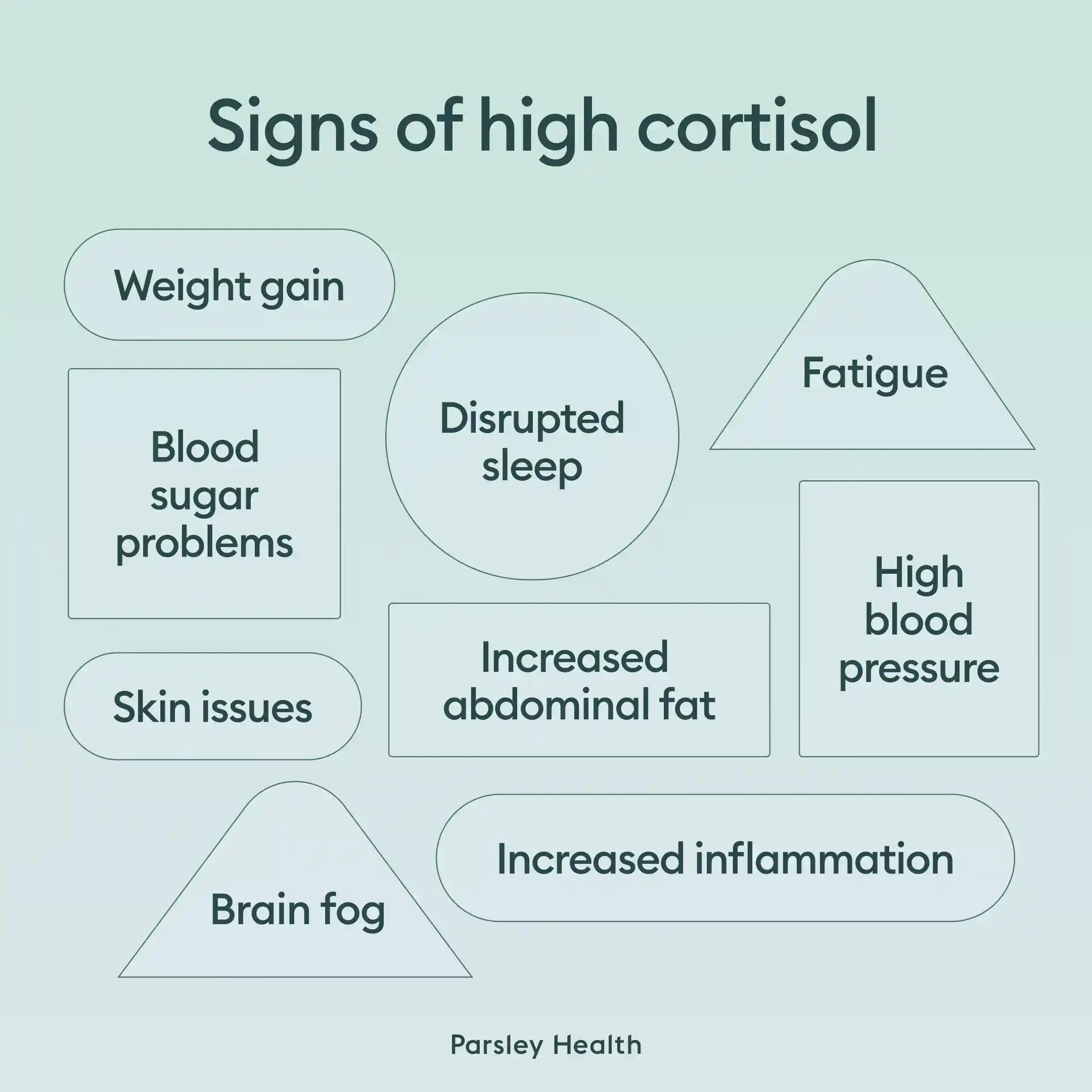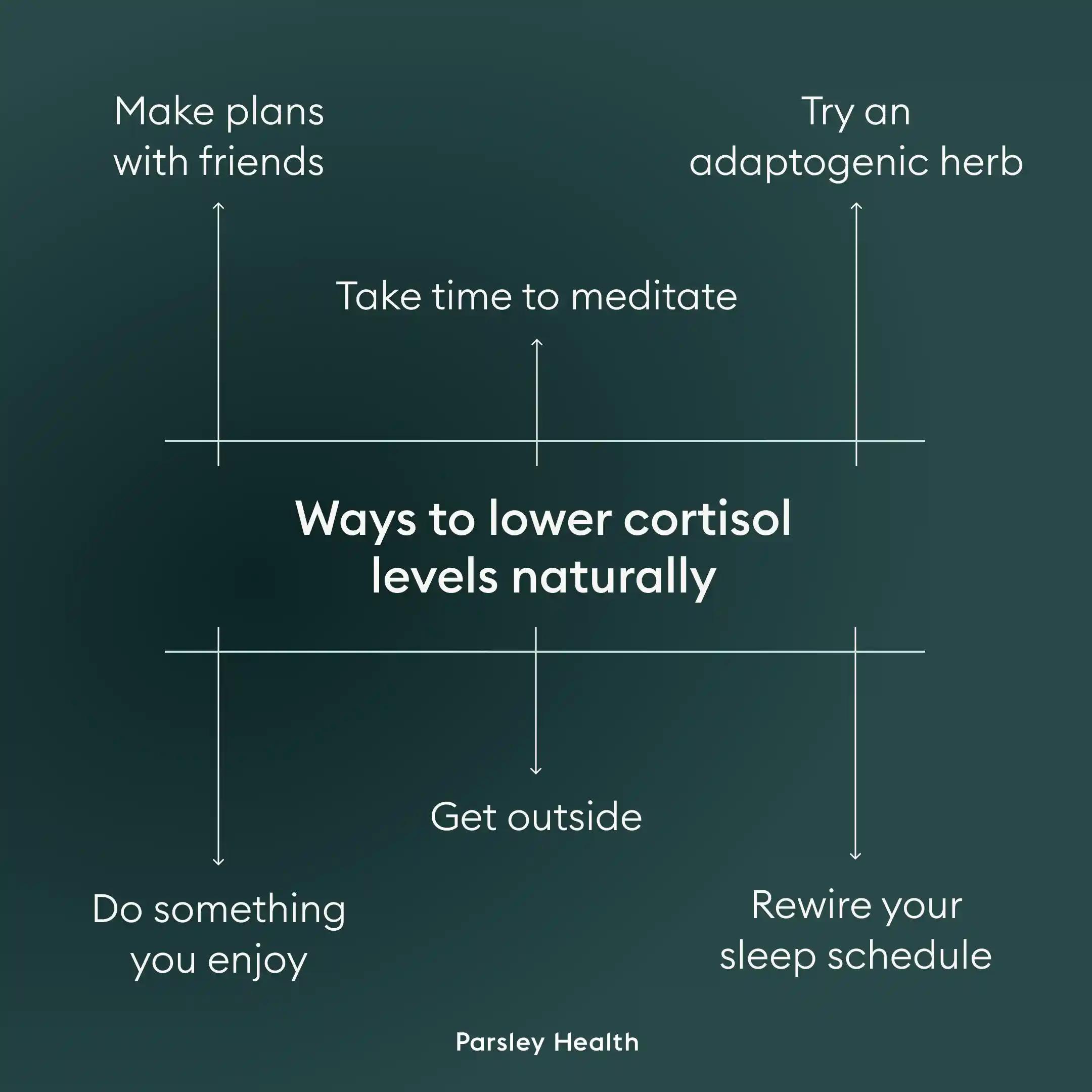Are you stressed out all the time? Chronic stress could be throwing your cortisol levels off their natural pattern. Learn how to recognize the signs of high cortisol and how to lower cortisol levels naturally.
Cortisol is one of the main hormones your adrenal glands produce. It’s known as the stress hormone because the adrenal glands release it at certain times of the day and when you’re experiencing physical and emotional stress. Cortisol increases your heart rate, blood pressure, blood sugar, and breathing rate to give you a natural energy boost to take on whatever stressor is coming your way.
That’s good in the short term. However chronic stress can lead to high cortisol levels, which can have a serious impact on health.
Understanding cortisol and stress
Cortisol is crucial for the entire body. “Known as the ‘stress hormone,’ it helps regulate metabolism, influences blood sugar levels, supports the immune response, controls inflammation, and affects the sleep-wake cycle,” says Resham Uttamchandani, MD, a double board-certified physician and founder of Doctor U.
Cortisol helps you get up and get going first thing in the morning. This is when cortisol should naturally be its highest. Cortisol should decrease throughout the day until we experience our lowest level before sleeping.
However, your cortisol level can jump if you encounter stress. “Cortisol is a fascinating hormone that’s incredibly adaptive, designed to help us respond to what we perceive as threatening situations,” says Samantha Bickham, LMHC, owner and primary therapist at Calming Tides Counseling, LLC.
When your body senses that it’s in a high-stress situation, it releases cortisol, which elevates your heart rate, increases blood pressure, and gives you an overall energy boost. At the same time, the high levels of cortisol in your blood signal the body to halt nonessential processes, such as digestion, it can focus on the threat at hand.
“It activates our defenses, allowing us to quickly react and protect ourselves without overthinking,” Bickham says. “In short bursts, cortisol is completely healthy and a normal response to stress.”
But problems can arise when stress is constant and regularly interrupts your usual bodily functions. Long-term elevated cortisol has been associated with high blood pressure, Type 2 diabetes, obesity, and osteoporosis.
It may also impact fertility. One study of more than 400 people assigned female at birth who were trying to get pregnant found that those with the highest levels of alpha-amylase—an enzyme that marks stress—were 29 percent less likely to conceive after a year of trying.
Chronically elevated cortisol can also play a role in mental health, often presenting in people with anxiety and depression. Reducing cortisol levels may improve symptoms of these mental health conditions. Dysregulated cortisol can also interfere with your ability to form memories.
High cortisol from chronic stress can even lead to cortisol dysfunction over time. “Cells become less responsive to cortisol, or disrupt the hypothalamic-pituitary-adrenal axis, changing cortisol’s natural rhythm,” Dr. Uttamchandani says. “Eventually, chronic stress can even result in low cortisol production, as the body becomes less able to produce cortisol effectively under constant demand.”
Signs of high cortisol
Since cortisol affects so many areas of our body’s functioning, the symptoms of high cortisol can look different for everyone. And they may even present differently at different times. The following are a few of the most common symptoms to look out for.

Managing stress and cortisol
Several options can help lower cortisol. Many involve regulating your stress response. Our autonomic nervous system (ANS) controls our involuntary bodily functions. Two of its main branches include the sympathetic nervous system (SNS) and the parasympathetic nervous system (PNS).
The SNS is commonly called “fight-or-flight” (which is our stress response), and the PNS is called “rest-and-digest” (our calm response). The SNS and PNS often work in opposition to each other. So in times of stress, we need to shift from fight-or-flight mode to rest-and digest mode.
“When we’re under chronic stress, our bodies keep producing cortisol because we’re constantly feeling on edge or hypervigilant,” Bickham explains. “This steady release of cortisol takes a toll on the body, as it’s not designed to stay in fight-or-flight mode for long periods.”
Here are some top tips for lowering cortisol levels naturally.

1. Try meditation.
Meditation activates the body’s relaxation response. This lowers cortisol and slows your breathing rate, relaxes muscles, and reduces blood pressure. It also stimulates regions of the brain that control anxiety. People who completed an online mindfulness program for one hour a week for eight weeks reported a 31 percent decrease in stress levels a year after the program.
A consistent mindfulness practice has also been shown to lower cortisol levels by helping you take on anxiety with focus and understanding. With more awareness of your thoughts, as well as the physiological signs of stress like an elevated heart rate, you can identify and address the stressor before it becomes a long-term problem. One study found that people assigned female at birth who were able to describe and accept their stressor had lower cortisol levels.
2. Exercise.
Exercise in general is a great tool to lower cortisol and make you more resilient to stress. But the length and intensity of your workouts can have a big impact on your cortisol levels. High-intensity exercise, even when done for just 30 minutes, significantly elevates cortisol levels.
High-intensity exercise is beneficial for the body. But keep your weekly sessions to just one or two and alternate with lower-intensity workouts. Lower-intensity workouts, like yoga or taking a nature walk, can reduce cortisol levels by increasing parasympathetic activity.
Consistent long-duration exercise can also elevate cortisol. When scientists studied the cortisol concentrations in the hair of endurance athletes, they found higher concentrations than in non-endurance athletes. Again, long-duration exercise has benefits. Just give your body time to recover between those lengthier sessions.
3. Get outside.
If your current lifestyle has you stuck indoors, a dose of nature could be just what you need to help lower cortisol. In one study, researchers had a group of people spend time walking through a forest one day and through a city another day. The results showed that the forest environment promoted lower cortisol, more parasympathetic nervous system activity, lower blood pressure, and lower pulse rate than the city environment did.
If you can’t escape the city, just make a point to get outdoors. Even spending just 20 minutes a day outside may improve cortisol levels and reduce stress.
4. Rewire your sleep schedule.
The quality and quantity of sleep can also influence cortisol levels. “Maintain a regular sleep schedule, minimize screen time before bed, and create a restful sleep environment,” Dr. Uttamchandani says. Aim for at least seven hours of uninterrupted sleep.
5. Make plans with friends.
Our connections with friends and family, especially when we feel close to them, can help lower cortisol. “Strong relationships and support systems have a calming effect on [our] stress response,” Dr. Uttamchandani says.
So make plans with loved ones and have a good laugh while you’re together. One study found that laughter can decrease stress. But don’t forget to savor a little time to yourself as well. Having too many obligations can also leave us stressed.
7. Do something you enjoy.
Maybe you like to knit, paint, garden, cook, bake, solve crossword puzzles, or do another hobby. Research shows that engaging in activities we enjoy can help lower cortisol. If you aren’t sure which hobbies suit you, try taking a few classes in something of interest to see if it sticks.
8. Eat a healthy diet
Some dietary fixes can also help you lower cortisol. Eliminate ultra-processed foods (UPFs) and opt for whole foods as much as possible. UPFs are often loaded with additives that can contribute to higher stress and cortisol levels. Eat more omega-3 fatty acids. Omega-3s reduce inflammation and cortisol and boost your body’s natural capacity to recover.
9. Reduce exposure to toxins
Chemicals in our environment, products, and food can also impact cortisol levels. Some chemicals are endocrine disruptors and can alter the function of your adrenal glands. Some of these chemicals are even called “obesogens,” meaning they can drive weight gain. To lessen exposure, try buying organic foods when possible. And purchase cleaning and personal care products that the Environmental Working Group has verified as safe.
10. Limit alcohol and caffeine
We can fall into the trap of thinking that alcohol helps us take the edge off stress. But Dr. Uttamchandani says it can stimulate cortisol production. Likewise, caffeine can also elevate the stress hormone, leaving you feeling wired but tired.
11. Try an adaptogenic herb
Adaptogens are a group of fungi and plant-derived compounds that help the body adapt to stress. Ashwagandha, one of the most popular members of this group, has been shown to reduce cortisol levels and calm anxiety. Ginseng and rhodiola are some other adaptogens that may help regulate cortisol.
Before taking an adaptogen or another supplement, be sure to consult a clinician. They can determine which supplements might work best for you, go over any safety concerns, and recommend a reputable brand.
When to seek medical attention
If you are experiencing unexplained or unexpected weight gain, muscle weakness, frequent infections, severe fatigue, mood changes, or difficulty concentrating, talk to a clinician. These symptoms could indicate that your cortisol level is elevated. These symptoms could also be the signs of an adrenal tumor. Adrenal tumors, although rare, cause Cushing’s syndrome.
FAQ
How do you reduce cortisol levels quickly?
You can reduce cortisol by lowering your stress level. Try meditation, gentle exercise, activities you enjoy, spending time with friends, and the other methods detailed in this article.
What foods reduce cortisol levels?
Omega-3 fatty acids can help reduce cortisol. Omega-3s can be found in fatty fish, flaxseeds, chia seeds, walnuts, and more.
What are the symptoms of chronically elevated cortisol?
Symptoms of high cortisol can include weight gain, fatigue, brain fog, sleep disturbances, high blood pressure, mood swings, and more.
How to know if cortisol is high?
If you are concerned that you have high cortisol, talk to a knowledgeable clinician. If necessary, they can test your level of the stress hormone.
Takeaway
The stress hormone cortisol is crucial for the body. However, chronic stress and other factors can lead to high or dysregulated cortisol.
If you’ve been experiencing any symptoms of high cortisol, you may want to ask your clinician about a 4-point cortisol test. For the at-home test, you collect saliva first thing in the morning, before lunch, before dinner, and before bed. The results show your cortisol levels throughout the day. Your clinician can then interpret the test and make any necessary recommendations.
Reach out to Parsley Health for a free consultation.
Parsley Health works with its members every day to lower cortisol levels and reduce chronic stress. Everyone’s lifestyle is different, and the stressors in your life aren’t the same as the stressors in, say, your best friend’s life. That’s why an action plan needs to be personalized to you and your lifestyle.
Typically, a plan starts with addressing the root cause of your stress and making changes to your diet, exercise, and supplement routine with the support of your Parsley Health clinician and health coach. They can help you understand your stress response and find ways to manage it. That way you have the tools to prevent future cortisol dysregulation.









